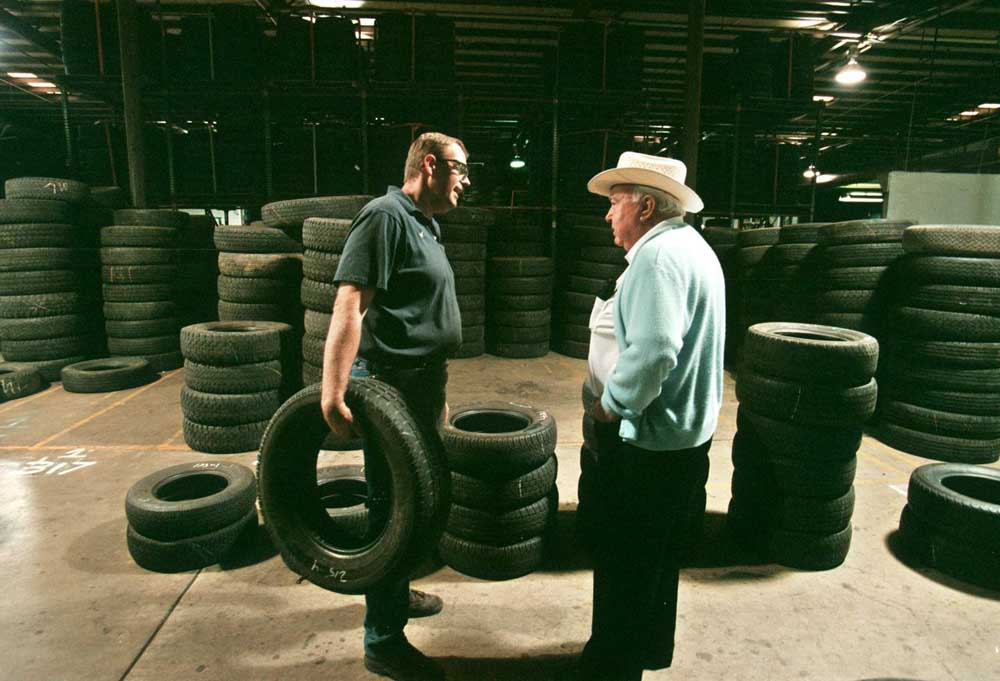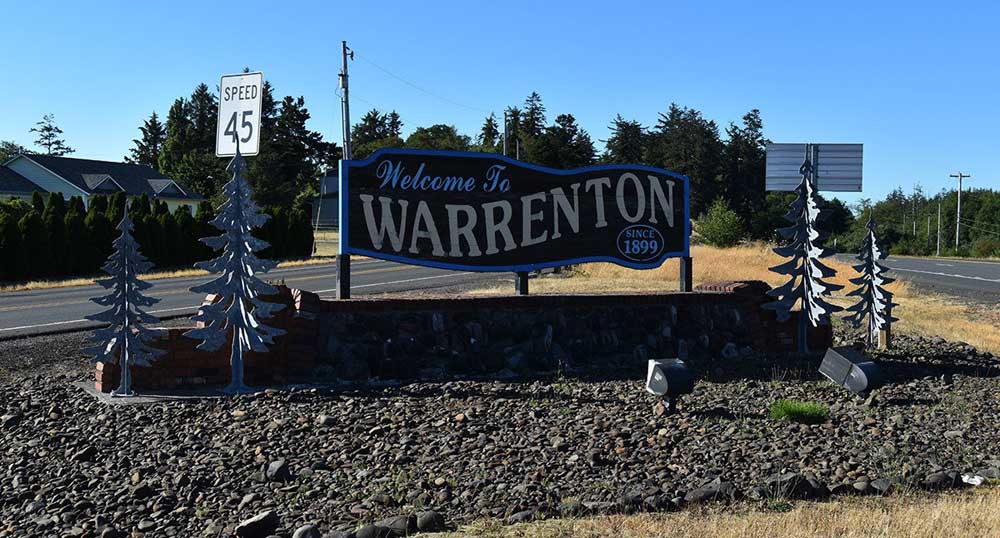Les Schwab sold to California investment fund
Published 1:51 pm Wednesday, September 30, 2020

- Les Schwab, right, talks with an employee in the company’s retread department in 1997.
Les Schwab Tire Centers has reached a deal to sell the Bend company to an investment fund in California called Meritage Group, ending local family ownership of one of Oregon’s best-known businesses.
Schwab Tire announced in December it would seek a buyer for the 68-year-old business, citing the difficulties of running a company in its fifth generation of family ownership.
Tire baron Les Schwab started the business in his hometown of Prineville in 1952 and grew it into one of Oregon’s largest companies with nearly 500 stores in 10 western states, and annual sales of $1.8 billion. The business remained in Schwab’s family after his death in 2007.
When Schwab announced its sale plans last year, Bloomberg reported the owners hoped for $3 billion in the deal. Schwab and Meritage did not report terms of Tuesday’s transaction but said the current management team will remain in place and Schwab will continue operating as it has.
“We see Les Schwab Tires as an ideal investment,” said Aubrey Barth, Meritage’s managing director, in a statement. “The company’s exceptional employees and programs, strong financials, and respected, customer-focused brand set it up for success for years to come.”
Meritage’s founder, Nat Simons, is a billionaire investor and climate change activist. Simons helps run a number of investment funds in addition to Meritage. It wasn’t clear how Les Schwab fits into his investment thesis.
Meritage manages more than $10 billion in assets. It has large holdings in Google, Charter Communications, Microsoft, Salesforce and Sherwin Williams Co., among others. It also owns Portland beverage distributor Columbia Distributing.
“Meritage Group has a history of preserving culture and values while growing its companies with investment over time. This is a great fit, and aligns well with Les’ vision and all we have built together,” Schwab CEO Jack Cuniff said in Tuesday’s announcement.
Schwab Tire is the latest in a succession of large, Oregon-based businesses to sell. Precision Castparts, Mentor Graphics and Vigor Industrial, among many others, have found new owners in the past few years.
Oregon now has few large, locally owned companies based here. It’s a trend that has worried economists for years, fearful that out-of-state owners would cut satellite operations in a downturn before trimming their headquarters.
When it announced sale plans, though, Schwab maintained any new owner would keep the company together and retain its Bend headquarters and Prineville distribution center.
“As our family grows and ages, it has been very important to us to remain committed and aligned behind our grandfather’s vision,” the Schwab family said in Tuesday’s statement. “While it was hard to make the decision to sell the Company, we are very confident Meritage Group will continue that commitment and alignment, and will build on all we have accomplished over the past 68 years.”
Meritage has a fairly low profile as an investment firm, with little public record of its investment philosophy or management practices. If Schwab had sold to a competitor the new owner might have consolidated operations, cutting jobs at the company’s Bend headquarters and combining its Prineville distribution center with facilities elsewhere.
Investment firms like Meritage could seek profits from Schwab by putting more money into growing the business, by changing operations or by cutting costs. Meritage said Tuesday it plans to invest in Schwab but Dave Garten, who teaches business strategy at Portland State University, said it’s impossible to gauge the new owner’s intentions without knowing more about its objectives and methods.
“Financial investors have a lot of different motives,” Garten said. “So we’re spitballing possibilities but we don’t really know yet.”
Ed Maletis was part owner of Columbia Distributing, and served on its board, when the Portland company sold to Meritage in 2012. On Tuesday, he said Meritage proved a good owner for his family’s old business and Maletis said he expects it will treat Schwab the same way, leaving management and operations intact.
“What Meritage brings as an owner is a significantly larger checkbook should the opportunity or need arise for further growth and/or acquisitions,” Maletis wrote in an email. “That has been a benefit to Columbia employees and I expect it will be the same for Les Schwab employees.”
Schwab Tire had suspended its sale plans in June, citing complications triggered by the coronavirus pandemic. And though the virus still rages, financial markets have been unexpectedly strong and corporate dealmaking has continued apace. Les Schwab’s sale is the latest evidence that the capital markets remain active.
Neither Schwab nor Meritage would say anything about the deal’s structure. Past sales of some prominent Oregon businesses, notably retail chain G.I. Joe’s, were financed with borrowing. The heavy debt load G.I. Joe’s took on in its 2007 sale sent that company into bankruptcy when the Great Recession hit.
Few businesses are as well known in Oregon as Les Schwab, which has clung to its small-town heritage for decades. Even as his tire business grew, Schwab himself adhered to his old-school business practices.
The company returns half the profits from each store to its employees (the tire chain said Tuesday that profit-sharing will continue under Meritage) and Les Schwab only hired managers from within the business. The chain has expanded as far south as Bakersfield, California and as far east as Denver, but all its tires still pass through its Prineville warehouse, in the high desert 36 miles northeast of Bend.
Tire jockeys still race out from service bays when cars pull into the parking lot to greet customers. The company often fixes flats for free, anticipating people will return when it’s time for their new tires.
Schwab himself resisted overtures from large investment firms and vowed he would never sell the business. He hoped his successors wouldn’t, either.
“The company isn’t for sale,’’ Schwab told The Oregonian in 1997. “It will go on, bigger and better than ever, and continue to provide opportunities for young people to be successful. All the stock will remain in our family.”
However, Schwab’s two children both died before he did. And though some of his heirs serve on the privately held company’s board, none hold executive positions with the company and none of his four grandchildren live in Oregon.
When his widow, Dorothy Schwab, died in 2016 at age 98, her obituary listed 17 direct descendants.





